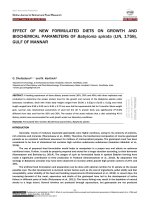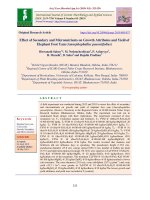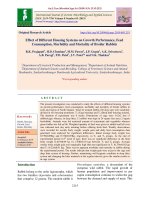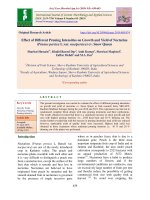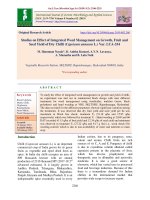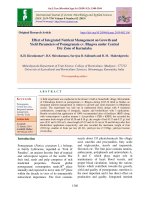Effect of dietary lipid level on growth perfo1
Bạn đang xem bản rút gọn của tài liệu. Xem và tải ngay bản đầy đủ của tài liệu tại đây (175.82 KB, 1 trang )
Qi-Cun Zhou, Jian-Bin Zhou, Shu-Yan Chi, Qi-Hui Yang, Chu-Wu Liu, 2007.
Effect of dietary lipid level on growth performance, feed utilization and digestive
enzyme of juvenile ivory shell, Babylonia areolate. Aquaculture.272(1-4):535-40.
Abstract
A growth trial was conducted to evaluate the effects of dietary lipid levels on
growth performance, feed utilization, carcass composition and digestive enzymes
of juvenile ivory shell. Six isonitrogenous and isoenergetic experimental diets (43%
crude protein and 15.46 kJ/g diet) using Pollack fish oil as the lipid source, were
formulated to contain six lipid levels (1.83, 3.83, 5.91,7.80, 9.76 and 11.73% dry
diet, respectively). Triplicate groups of 50 shells (average weight 160.50 ± 1.20
mg) were stocked in 120-l tanks and fed to apparent satiation twice daily for 10
weeks. The results showed that growth performance and feed utilization were
significantly affected by dietary lipid levels (P < 0.05). Maximum weight gain,
mean protein gain and specific growth rate occurred at 5.91% dietary lipid level (P
< 0.05), soft body to shell ratios were not significantly difference above 3.83%
dietary lipid level, and there were no significant differences (P < 0.05) in survival
of ivory shell fed the experimental diets. There were significant difference in
protein, lipid, moisture and ash content in soft body (P < 0.05). Lipid content in soft
body positively correlated with dietary lipid level, however, protein and ash content
in soft body significantly decreased with the increase in dietary lipid level. Pepsin
activity in soft body significantly increased with dietary lipid level increasing from
1.83 to 7.80%, and trypsin-like enzyme activity significantly increased with
increase in dietary lipid level from 1.83 to 5.91%. However, lipase activity in soft
body increased with an increase in dietary lipid level, but amylase activity was not
significantly affected by the dietary lipid level. The results of this trial indicated
that dietary lipid levels above 7.80% dry matter did not improve growth
performance or feed utilization of juvenile ivory shell. Quadratic regression.



